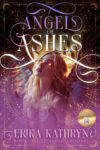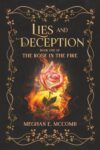Review: The Realms Thereunder
General Comments. The Realms Thereunder by Ross Lawhead, labeled general fantasy fiction, though published by Thomas Nelson, a Christian publishing house, is perhaps best suited to a young adult audience, though adults may get the most out of it — there’s a lot here to think about. It’s important to note that this is the first in The Ancient Earth Trilogy. Clearly, this book is the beginning of a larger story, though it reads somewhat as a stand-alone. There is a logical end point, though many of the story questions remain unanswered.
The Story. Protagonists Daniel and Freya are on divergent paths, yet they share a unique link from their early teens. While on a school field trip, they “went missing.” For days the world was in a panic looking for them, but they were in a realm beneath, engaged in adventure and the attempt to find the way home.
Switching back to the present off and on, the story follows the adult Daniel as he’s sent into yet another realm — Elfland — then Freya, as she’s duped and deluded, and finally a third person who doesn’t seem to fit into the picture until the end — Alex, the policeman turned mythical-creatures hunter.
Strengths. Ross Lawhead has courageously stepped out of the standard linear story structure and told his tale using a change of time perspective as well as a change of the storyline.
In addition, he weaves Anglo-Saxon mythology generously, with a dab of history, into the contemporary story. It’s an interesting mix. Further, he has a section — Daniel in Elfland — that reminded me a great deal of C. S. Lewis’s Out of the Silent Planet. Whether this is intentional or not, I can’t say. But I liked it in Lewis’s work, and I liked it equally so in The Realms Thereunder.
Another positive worth noting, there’s little overt reference to God or religion, but there is much that appears to work as symbolism. As an illustration, three different CSFF Blog Tour participants independently selected the same quote that held spiritual significance for each. For a more detailed look at this aspect of the story see Thomas Clayton Booher‘s day three post.
In short, The Realms Thereunder is a layered story that gives the reader much to think about. It’s also unique and creative in its concept and execution. What’s more, I think all of these innovative things work, and they make the story well worth reading.
Weaknesses. Reviews suggest readers have a wide variety of responses to this book. Here’s why, in my opinion:
1. The omniscient point of view, always more distant than first person or third person limited, did not help me to know the characters well.
In addition, in a section of the story when Freya has been duped and is delusional, the story slips into her point of view, but there’s no clue that this has happened and that the reader should not rely on what she’s experiencing. Hence, I began to cast about, trying to make sense of what was happening. Was the story now entering a third, future, time period? By the time I realized what was happening, I’d been pulled from the story.
The greater issue, however, was that I never felt closely attached to the characters.
2. While the primary characters are unique and believable, they don’t have goals or needs they are trying to meet. In the past portion of the story, Freya has wanted to go home from the moment she arrived in the underworld realm, but she made no plans to achieve this goal. After some time Daniel and Freya have a goal at last, but they seem to wander along with the two knights in a rather haphazard search for something others believe is necessary.
3. In addition to the wandering factor, the personal stakes for Daniel, Freya, and the extraneous Alex — a policeman who also has an apparently unrelated storyline — seem low. The reader already knows that Daniel and Freya survive their teen adventures, or there would be no adult thread, so whatever dangers they encounter carry little or no threat.
And the adult threads don’t seem to have high stakes because in these segments the characters seem to be moving wherever greater forces dictate, as if they have little or no say about where they go.
There’s actually one conversation about this very subject which makes me think there is much happening that will be revealed in the next book, but in this one, their manipulated wanderings didn’t make for compelling reading, I didn’t feel.
4. This just might be me, but I found the prose to be off-putting. Well, that’s too strong. For the most part I knew what was taking place, but there were segments that confused me, others that seemed slow (written in passive voice, for example), and still others that told rather than showed. Here’s an example of the latter: “Swi∂gar pulled his spear back and lunged for another attack, but it was the worst thing he could have done” (p 347, emphasis mine).
Recommendation. So what did I think? I think Ross undertook an ambitious project for his debut novel. I admire him for the effort and am glad I read it for all the thought-provoking material it provided. And the fact is, there are people who loved it and breezed through it. I labored, but it’s not time I regret.
So how do I sum it up? I recommend this one if you love Anglo-Saxon history and/or mythology. That alone will make the book worthwhile. I recommend it for those who enjoy a unique take on fantasy tropes — not a portal to another world, but a passage to another realm in this world, and that realm (those realms?) is beginning to bleed back the other way. Lots of promise for the next two books in the trilogy.
Originally posted at A Christian Worldview of Fiction
In conjunction with the CSFF Blog Tour, I received a free copy of this book from the publisher, though quite obviously that fact had no bearing on my review.























Share your fantastical thoughts.